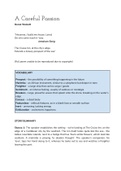A Careful Passion
Derek Walcott
“Hosanna, I build me house, Lawd,
De rain come wash it ‘way.
Jamaican Song
The Cruise Inn, at the city’s edge,
Extends a breezy prospect of the sea”
(Full poem unable to be reproduced due to copyright)
VOCABULARY
Prospect - the possibility of something happening in the future
Marimba - an African instrument, similar to a xylophone but deeper in tone
Freighter - a large ship that carries cargo / goods
Sentiment - an intense feeling, usually of sadness or nostalgia
Breakers - large, powerful waves that splash onto the shore, breaking on the water’s
edge
Carcass - a dead body
Featureless - without features, as in a blank face or smooth surface
Inert - unmoving, lacking energy
Exhilaration - excitement, happiness
STORY/SUMMARY
Stanza 1: The speaker establishes the setting - we’re looking at The Cruise Inn, on the
edge of a Caribbean city by the seafront. The Inn itself looks quite like the sea - the
tables resemble islands, next to a hedge that has ‘foam-white flowers’, which look like
seafoam. A marimba is playing ‘to deaden thought’. The speaker’s companion, his
‘love’, taps her hand along to it, whereas he looks out to see and watches a freighter
leaving the port.
, Stanza 2: The speaker remarks that it’s hard to smell the salt breeze, unless you are at
the harbour’s edge by the sea. In the South, there are small islands that smell
completely of sea, but here other smells must get in the way. Thinking of those islands
triggers a memory - a beautiful, deserted beach with green waves, a woman with ‘wet
hair’, ‘a grape-red mouth’. Her hand ‘wears her husband’s ring’, suggesting that she is
married and that she’s having an affair with the speaker. Her other hand brushes away
flies and she says “Sometimes I wonder if you’ve lost your speech”, implying frustration
or a lack of enjoyment with the speaker’s company.
Stanza 3: The gulls are happy, and the lovers are gently washed in soft, perhaps sad or
overly soppy feelings (‘sentiment’) as they sit at the table by the harbour. The speaker
remarks that those who have been hurt by love before are expecting to get hurt again
and used to letting go. He switches to a vision of himself dead, his carcass swollen by
the sun, his eyes covered in sand as the body spins and turns in the waves. To break up
with his lover, he makes the clichéd but true excuse that they will ‘both get hurt’ if they
continue. He switches back to the vision of himself briefly, describing himself as
‘featureless, inert’ before continuing with the scene - he strokes her hand, while her
skirt ripples in the wind.
Stanza 4: The speaker resolves that it is ‘better to lie’ …, to go through the motions that
the woman would expect during a break up, smiling as if he’s ‘in pain’, trying to tap into
his buried emotions, twirling a glass as if he’s an actor who has perfectly rehearsed
these lines. He says again “Yes, this is best, things might have grown much worse…”
Stanza 5: He tries to convince himself that this is also the truth, their relationship
definitely could have been worse. On this evening, everything is exciting, full of
heightened and mixed emotions. Especially when they mirror each other, they both
have broken hearts and this is what created the initial connection, the ‘original curse’
that is wrong with the speaker is also the same in the woman. The speaker bids
farewell, slowly, to the woman, he starts letting go of the promises they made to each
other, which they had only half been able to fulfil. Her eyes shine brightly, perhaps
stung by the salt wind but also likely to be pained by the moment, as they sit at the
table by the sea.
Stanza 6: They walk back together into the city, as shops are closing and it’s getting
dark. The gulls are still circling, hunting for something, and he wonders if - like them -
they are looking for ‘pity’.





